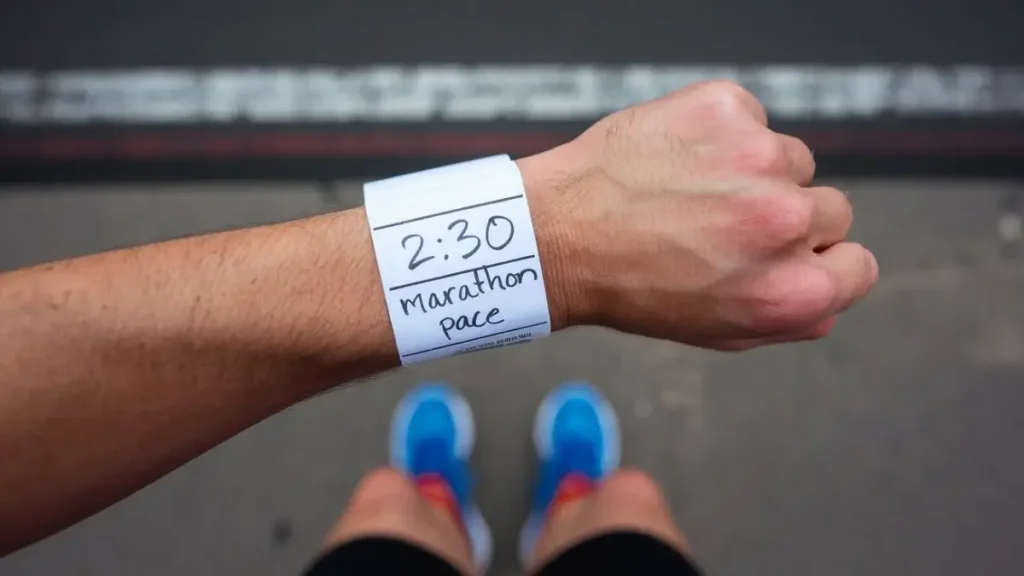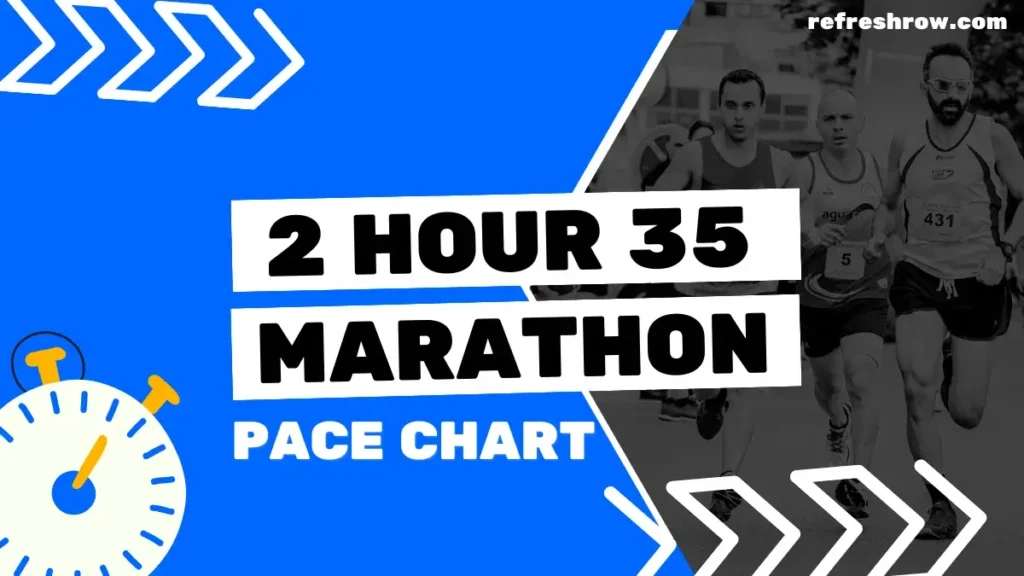To run a 5:00 hour marathon you need to run at a pace of 11:27 per mile or 7:07 per kilometer.
Following the splits below (and shaving off a second), you’ll run a sub 5:00 marathon.
I’d recommend aiming to run 1-2 minutes ahead of the split target time from 10 miles, as you’ll likely come up against crowding on race day.
5:00 Marathon Pace in Miles
| Mile | Split |
|---|---|
| 1 | 11:27 |
| 2 | 22:53 |
| 3 | 34:20 |
| 4 | 45:46 |
| 5 | 57:13 |
| 6 | 1:08:39 |
| 7 | 1:20:06 |
| 8 | 1:31:32 |
| 9 | 1:42:59 |
| 10 | 1:54:25 |
| 11 | 2:05:52 |
| 12 | 2:17:18 |
| 13 | 2:28:45 |
| 14 | 2:40:11 |
| 15 | 2:51:38 |
| 16 | 3:03:05 |
| 17 | 3:14:31 |
| 18 | 3:25:58 |
| 19 | 3:37:24 |
| 20 | 3:48:51 |
| 21 | 4:00:17 |
| 22 | 4:11:44 |
| 23 | 4:23:10 |
| 24 | 4:34:37 |
| 25 | 4:46:03 |
| 26 | 4:57:30 |
| 26.2 | 5:00:00 |
Download
5:00 Marathon Pace in KM
| KM | Split |
|---|---|
| 1 | 7:07 |
| 2 | 14:13 |
| 3 | 21:20 |
| 4 | 28:26 |
| 5 | 35:33 |
| 6 | 42:40 |
| 7 | 49:46 |
| 8 | 56:53 |
| 9 | 1:03:59 |
| 10 | 1:11:06 |
| 11 | 1:18:12 |
| 12 | 1:25:19 |
| 13 | 1:32:26 |
| 14 | 1:39:32 |
| 15 | 1:46:39 |
| 16 | 1:53:45 |
| 17 | 2:00:52 |
| 18 | 2:07:59 |
| 19 | 2:15:05 |
| 20 | 2:22:12 |
| 21 | 2:29:18 |
| 22 | 2:36:25 |
| 23 | 2:43:32 |
| 24 | 2:50:38 |
| 25 | 2:57:45 |
| 26 | 3:04:51 |
| 27 | 3:11:58 |
| 28 | 3:19:05 |
| 29 | 3:26:11 |
| 30 | 3:33:18 |
| 31 | 3:40:24 |
| 32 | 3:47:31 |
| 33 | 3:54:37 |
| 34 | 4:01:44 |
| 35 | 4:08:51 |
| 36 | 4:15:57 |
| 37 | 4:23:04 |
| 38 | 4:30:10 |
| 39 | 4:37:17 |
| 40 | 4:44:24 |
| 41 | 4:51:30 |
| 42 | 4:58:37 |
| 42.2 | 5:00:00 |
Download
Other Marathon Pace Charts
Targeting a different time?
Check out the Full Marathon Pace Chart in Miles or KM
Or select a specific finishing time below:
| 3:00 | 4:00 | 5:00 | |
| 3:05 | 4:05 | 5:15 | |
| 3:10 | 4:10 | 5:30 | |
| 3:15 | 4:15 | 5:45 | |
| 3:20 | 4:20 | 6:00 | |
| 3:25 | 4:25 | 6:15 | |
| 2:30 | 3:30 | 4:30 | 6:30 |
| 2:35 | 3:35 | 4:35 | 6:45 |
| 2:40 | 3:40 | 4:40 | 7:00 |
| 2:45 | 3:45 | 4:45 | |
| 2:50 | 3:50 | 4:50 | |
| 2:55 | 3:55 | 4:55 |
Training for a 5:00 Marathon
Is 5:00 a Good Marathon Time?
Well, what do the stats say?
Run Repeat conducted a study that contains 19,614,975 marathon results from more than 32,335 races across the globe, here is how a 5:00 marathon compares against age and gender for the races recorded:
| Overall | You’re faster than 25.2% of all runners. |
| Male | You’re faster than 17.9% of males. |
| Female | You’re faster than 34.9% of females. |
| <20 | You’re faster than 25.3% of under 20s. |
| 20-29 | You’re faster than 18.5% of 20-29 year olds. |
| 30-39 | You’re faster than 18.5% of 30-39 year olds. |
| 40-49 | You’re faster than 22.0% of 40-49 year olds. |
| 50-59 | You’re faster than 32.9% of 50-59 year olds. |
| >60 | You’re faster than 54.7% of over 60s. |
Training Runs and Paces for a 5:00 Marathon
To break a 5:00 marathon you’ll need to do some serious distance in your training, I recommend at least 10 miles (16km) per week.
You’re also going to need to make sure you’ve crossed off these milestones for other race distances:
- A 5k in 31:15
- A 10k in 1:04:50
- A half marathon in 2:16:00
Training Paces
| Pace | Mins per Mile | Mins per KM |
|---|---|---|
| Easy | 12:53 | 8:00 |
| Steady | 11:27 | 7:06 |
| 10k | 10:29 | 6:31 |
| 5k | 10:04 | 6:15 |
| 1 Mile | 9:20 | 5:50 |
Weekly Mileage Targets
| Target Mileage: | Gradually increase your weekly mileage from 14 miles (22 km) to a peak of 20 miles (32 km). |
| Incremental Increase: | Increase mileage by approximately 10% each week, with every fourth week as a recovery week where mileage is reduced by 20-30%. Make sure to taper for the last 1-2 weeks. |
Long Run Structure
| Total Distance: | Build up to long runs of 14-16 miles (22-26 km). |
| Segment Example: | First 5 miles (8 km): Easy pace, heart rate 140-150 bpm (approximately 14:00/mile or 8:41/km). Next 1 mile (1.6 km): Fast pace at 9:50/mile (6:07/km). Next 5 miles (8 km): Medium effort, heart rate around 160 bpm (approximately 10:50/mile or 6:44/km). Repeat: Continue alternating the segments (4 miles easy, 1 mile fast, 4 miles medium) until the long run distance is achieved. |
Why This Works: Incorporating varied paces within long runs enhances lactate tolerance, which helps on race day when you’ve got to maintain pace despite feeling fatigued. By practicing surges during a run, you can build up your physical and mental resilience (lots of elite marathon runners use these strategies during their training)
Alternating Long Runs: Alternate between structured long runs (easy/fast segments) and easier long runs. For easier long runs, maintain a steady, comfortable pace throughout, focusing on mileage rather than speed to aid recovery.
Speedwork Sessions
| Short Intervals: | – 400m repeats at 4:55 per interval (6:07/km). – Aim for 8-10 repetitions with equal time for recovery. |
| Mile Repeats: | – 1 mile repeats at 9:50 per mile (6:07/km). – Aim for 4-6 repetitions with a 1-2 minute recovery jog. |
| Longer Intervals: | – 2 mile repeats at 10:00 per mile (6:12/km). – Aim for 3-4 repetitions with a 2-3 minute recovery jog. |
Recovery and Rest Days
| Rest Days: | Incorporate 1-2 rest days per week to allow your body to recover and prevent overtraining. |
| Easy Run Days: | Include 1-2 easy run days per week at a relaxed pace of 14:30/mile (9:01/km), covering 3-5 miles (5-8 km) per day. Try to keep your heart rate below 140 bpm on easy days to ensure proper recovery and aerobic development. |
My Tips to Run a Sub 5:00 Marathon
Focus on Running by Effort, Not Just Pace
During the race, especially in the second half, your effort level might not match the pace you were holding earlier.
Instead of stressing about the exact pace, focus on maintaining an even effort, especially if the terrain changes or fatigue sets in.
If you feel good on a flat section, slightly increase your pace.
If it’s an uphill or you’re feeling tired, allow yourself to slow down while keeping the effort steady.
Try to remember, that to have a chance of getting your target time, you have to cross the finish line first.
Don’t Be Afraid to Walk Briefly
In a 5-hour marathon, walking isn’t a sign of failure – it can be used as a strategy.
Incorporating brief walking breaks, like at every aid station or at regular intervals, can help keep your energy steady.
A run-walk approach (such as running for 5-7 minutes, walking for 1 minute) can make the overall pace more sustainable and still keep you on target to finish in under 5 hours.
Try this out in your training, as it doesn’t work for everyone.
So prefer to slow the pace and keep running throughout, as they find it hard to get going again.
Start Slow, Finish Strong
In the excitement at the start, it’s easy to go out too fast.
Instead, aim to run the first few miles a little slower than your goal pace (about 11:27 per mile).
This strategy will help you conserve energy for the later miles when fatigue sets in.
Top Tip: It’s not about how fast you start, but how strong you finish.
Nail Your Fueling to Maintain Pace
Maintaining a 5-hour pace requires keeping your energy levels stable.
Start fueling early – don’t wait until you feel tired or hungry.
Plan to take in small amounts of carbohydrates (gels, chews, or sports drinks) every 30-45 minutes, even in the early miles.
It can feel odd as you’ll feel like you don’t need them yet, but it will pay dividends later in the race…
Keeping your glycogen stores topped up helps avoid hitting the wall and allows you to keep your pace steady throughout the marathon.


Row Brown is the founder of Refresh Row. He is a keen marathon runner, his favorite being the London Marathon. He’s now set himself the mission of Running the Entire Length of Spain, which is scheduled for late 2024.


